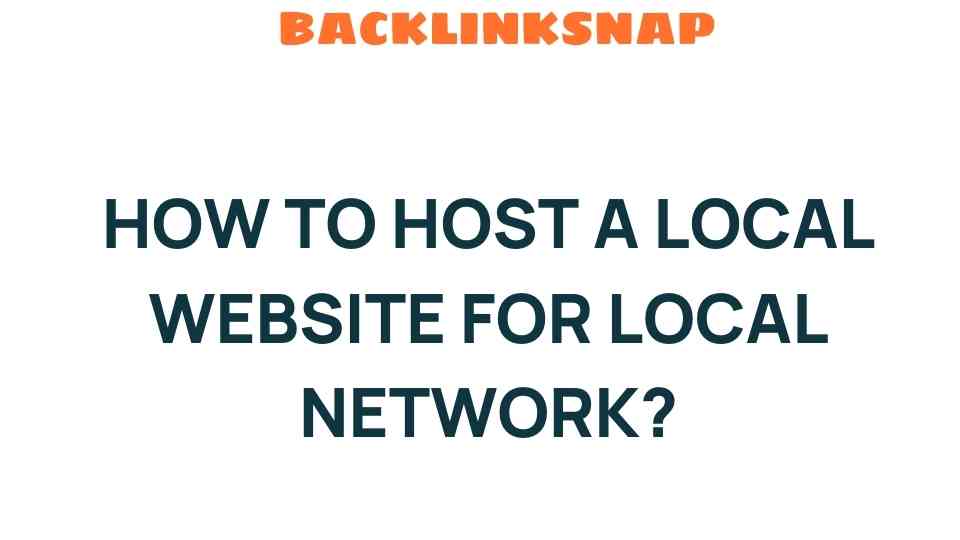Unlock the Secrets: How to Host a Local Website for Your Network
In today’s digital age, the concept of local website hosting has gained significant traction, particularly for small communities and organizations looking to create a vibrant online presence without relying on the vast internet. Whether you’re a business, a local school, or a community group, setting up a local website can foster better communication, collaboration, and engagement among members. This article will explore the nuances of local website hosting, from setting up a network server to effective intranet solutions.
Understanding Local Website Hosting
Local website hosting refers to the practice of hosting a website on a local network instead of a public server. This means that the website is accessible only to users within a specific area, typically a local area network (LAN). This can be particularly useful for organizations that want to maintain privacy, enhance security, and ensure faster access to their resources.
By utilizing local website hosting, you can create a dedicated space for community networking, where members can easily share information, access resources, and collaborate on projects. This approach is not only cost-effective but also allows for greater control over content and user access.
Steps for Setting Up a Network Server
The first step in local website hosting is to establish a network server setup. Here’s how you can go about it:
- Choose Your Server Hardware: Depending on your needs, you can use an old PC, a dedicated server, or even a network-attached storage (NAS) device. The choice largely depends on the expected traffic and resources required.
- Select an Operating System: Popular options include Linux, Windows Server, or even macOS. Linux is often favored for its stability and lower cost.
- Install Web Server Software: Common choices include Apache, Nginx, or Microsoft IIS. These programs will serve your website files over the network.
- Configure Network Settings: Assign a static IP address to your server to ensure that it remains accessible at the same address. This is crucial for local access websites.
Web Server Configuration
Once your server is set up, it’s time to dive into web server configuration. Proper configuration is essential for ensuring that your website runs smoothly and securely. Here are some key considerations:
- Firewall and Security Settings: Implement firewall rules to control traffic to and from your server. This can help protect against unauthorized access.
- Setting Up Virtual Hosts: If you’re hosting multiple sites on one server, configure virtual hosts to manage them efficiently.
- Enable SSL: For enhanced security, especially if you’re dealing with sensitive information, configure SSL certificates to encrypt data transmission.
Implementing Intranet Solutions
For organizations looking to create a more structured internal network, consider implementing intranet solutions. An intranet can facilitate better communication and information sharing among members. Here are a few applications you might want to consider:
- Content Management Systems (CMS): Platforms like WordPress or Joomla can help you create and maintain rich content on your local website.
- Collaboration Tools: Tools like Nextcloud or ownCloud can support file sharing and document collaboration.
- Forums and Discussion Boards: Consider setting up forums to foster discussion and community engagement.
Advantages of Local Website Hosting
Local website hosting offers a myriad of advantages that can significantly benefit your organization or community. Here’s why you should consider this approach:
- Enhanced Security: Since the server is local, you have complete control over who accesses your data and how it is managed.
- Cost-Effective: Local hosting eliminates the need for expensive subscriptions to external hosting services.
- Speed and Reliability: Accessing a local server typically results in faster load times and improved performance.
- Customization: You can tailor your website to meet the specific needs of your community without the constraints of public hosting services.
Best Practices for Local Website Hosting
To ensure a successful local website hosting experience, it’s essential to follow certain best practices:
- Regular Backups: Always keep backups of your website data to prevent loss due to hardware failure or other issues.
- Monitor Performance: Keep an eye on your server’s performance to identify and address any potential issues before they escalate.
- Update Software Regularly: Ensure that your server software, CMS, and any plugins are regularly updated to protect against vulnerabilities.
FAQs About Local Website Hosting
1. What is local website hosting?
Local website hosting is the practice of hosting a website on a local network, making it accessible only to users within that network.
2. How do I set up a network server?
To set up a network server, choose appropriate hardware, install a suitable operating system, set up web server software, and configure the network settings.
3. What are the benefits of intranet solutions?
Intranet solutions provide improved communication, enhanced collaboration, and secure access to resources for members within an organization.
4. Can I host multiple websites on one local server?
Yes, you can host multiple websites on one local server by configuring virtual hosts within your web server software.
5. What security measures should I take for local website hosting?
Implement firewall rules, use SSL for encryption, and regularly update your software to enhance security.
6. How can community networking benefit from local website hosting?
Local website hosting fosters community networking by providing a dedicated space for sharing information, resources, and collaboration among members.
Conclusion
Hosting a local website for your network is a powerful way to enhance communication, collaboration, and engagement within your community. By following the steps outlined in this article, from setting up a network server to configuring web server settings and implementing intranet solutions, you can create an efficient and effective online platform tailored to your specific needs. Embrace the potential of local website hosting and unlock new opportunities for growth and connection within your community!
For further reading on web hosting solutions, check out this resource.
This article is in the category Digital Marketing and created by BacklinkSnap Team




